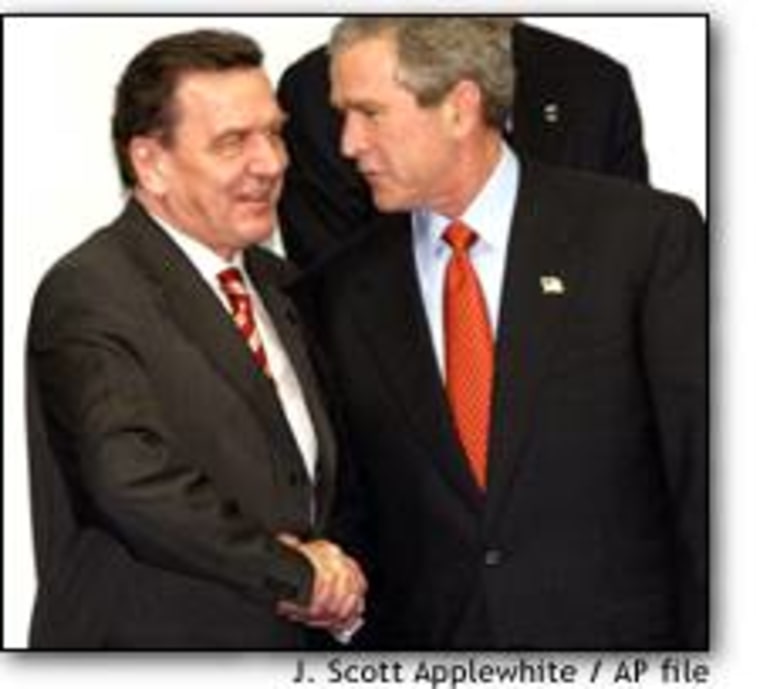In Florence recently, hundreds of thousands of protesters turned their long-planned anti-globalization march into a rally against a possible U.S.-led war on Iraq. “Drop Bush, not bombs,” read one sign. Such sentiments express not only European anger with U.S. foreign policy, but also the fraying relationship between the historic allies.
In the dysfunctional family of the Western world, continental Europe has long held a certain disdain for the United States — like that of an older brother who believes he has wisdom on his side, even as a younger sibling surpasses him in many ways.
As European empires declined and the United States grew ever more powerful, anti-American resentments took hold, the type expressed by condescending Parisian shopkeepers and the sarcastic smiles of British politicians appearing publicly with their American counterparts.
The bonds forged by the United States and Europe during World War II have kept them together, but even those historic ties are fraying.
End of an era?
“The End of the American Era,” a newly published book by Charles A. Kupchan, argues that a better integrated Europe is now emerging “not just as a counterweight to the United States, but an angry one at that.”
Citing opinion polls conducted in France, Germany, Italy and Great Britain the summer of 2001, he notes the widespread disapproval of the Bush administration’s decision to withdraw from the Kyoto climate change agreement and opposition to a U.S. plan to walk away from the Anti-ballistic Missile Treaty. Seventy-eight percent of those polled believed the Bush administration makes decisions “entirely on U.S. interests” without regard for what benefits Europe.
“The issues that prior to Sept. 11 divided America, Europe, Russia and China did not disappear,” Kupchan writes. “They were only masked by a temporary solidarity.”
Following the Sept. 11, 2001, attacks on the United States, there was an outpouring of sympathy and support from Europe — including political and military support for the war on terrorism.
But the immediacy of the attacks has faded, and the Florence protest was just one sign of the re-emerging frustration with the Bush administration and its tendency to act with little or no consultation with its longtime allies.
Iraq: A test of alliances
The contentious debate over Iraq and whether military action will be necessary to disarm it is proving a real test of ties.
Forming an unexpected alliance in the Security Council debate over Iraq, France and Russia led opposition to the U.S. effort to make a direct threat of military action against Baghdad if it did not comply with U.N. demands to allow weapons inspectors full access to Iraq.
“As the Bush administration increasingly looks to war as its weapon of first resort in international relations, this joint venture by two of Europe’s most important states may not be the last,” wrote columnist Jonathan Steele in the British daily Guardian on Nov. 12.
It was in part the “taboo-breaking criticism” of Bush administration tactics by Germany’s liberal candidate Gerhard Schroeder, that helped bolster France and Russia’s opposition to the United States, says Steele.
During his campaign for re-election as German chancellor, Schroeder used anti-war sentiment to rally voters to his camp. His position and his justice minister’s comparison of Bush to Adolf Hitler apparently helped him scrape together enough votes to retain his job. It infuriated the Bush administration.
Schroeder’s rift with the United States has since been papered over. At a NATO gathering in Prague in November, the two leaders made a show of shaking hands. But this shaky relationship is certain to be tested again if the United States goes to war against Iraq. During the summit, German Foreign Minister Joschka Fischer repeated that Berlin would not take part in a military strike against Iraq, which he said would be “a catastrophe.”
Generational shift
As one woman interviewed in Germany suggested, the Germany public’s memory of U.S. reconstruction efforts in post-war Europe have faded, and younger people are more critical of America.
“My mother is not enthusiastic about American influence and says Americans interfere too much in our culture — that their politics are like those of a colonial power,” said Maren Goschke, a 34-year old in Mainz. “I think more drastically. I think that the American military jets fly above me and we don’t know what is in them. That is not OK. And in our generation we don’t have the direct (experience of) after the war, when the Americans helped us.”

If Iraq is deemed to be hiding weapons of mass destruction, will other European countries support the United States in a military campaign, or will they side with Germany?
Europeans for the most part have maintained their center-left leadership, with the exception of the Italians, who are governed by a relatively pro-American conservative coalition.
European politicians don’t want to alienate the United States — still a very important commercial and military force — but they also want to prove to their constituents that they are not American puppets.
Leaders who throw their support behind a war will have to justify it to their constituents. As it is, when Bin-Laden’s latest audiotaped recording threatened America’s European allies by name for supporting U.S. policies, many regular people on the continent wondered if they weren’t being wrongfully sucked into “America’s fight.”
NBC’s Stephen Weeke in Rome and Andy Eckardt in Mainz, Germany contributed to this report.
